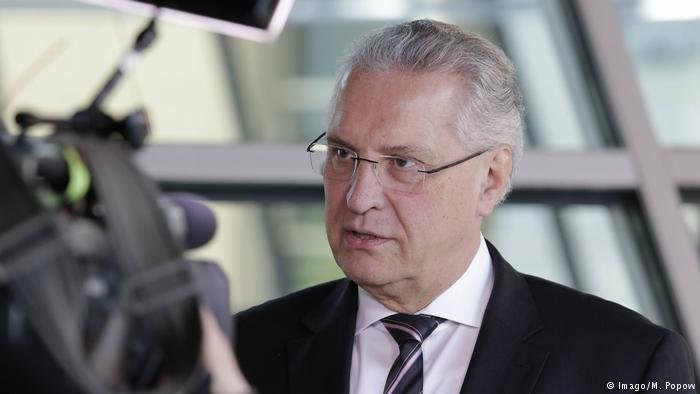Asylum applications in Bavaria dropped by over 50 percent in early 2025 compared to the previous year. A similar trend was reported in neighboring state Saxony in 2024 too. While state officials credit new policies for the drop, others think the decline may be due to other factors, including changing conditions in countries of origin.
Bavaria has witnessed a dramatic decline in the number of asylum seekers arriving in the region, with figures from the first five months of 2025 showing a drop of more than 50 percent compared to the same period in 2024.
According to the Bavarian Interior Ministry, only 5,323 asylum seekers were registered between January and May 2025, down from 11,739 during the same period the previous year – a decrease of around 55 percent.
A similar trend was reported this week in the neighboring state of Saxony for arrivals in 2024. On June 3, Saxony's Commission for Foreigners Geert Mackenroth, confirmed that in 2024, 10,120 asylum seekers were accommodated in the initial reception facilities. In 2023, there were more than twice as many people at 23,132. The highest refugee numbers were reached in 2015, when 69,900 asylum seekers were taken in, reported the German press agency dpa.

Bavaria's Interior Minister Joachim Herrmann attributes the significant reduction in his state partly to enhanced border controls and other measures designed to reduce irregular migration, which he says are beginning to yield results. "We have registered roughly 55 percent fewer asylum seekers than the previous year," Herrmann noted during a press conference. Voluntary departures and deportations are also rising: in the first four months of 2025, 4,842 people left Bavaria voluntarily, while 1,233 were formally deported – meaning more people left the state than arrived during that time.
Stephan Dünnwald at the Bavarian Council for Refugees however criticizes the connection the Bavarian interior minister draws between the decline in numbers and an increase in deportations and so-called 'voluntary departures.' "In reality, Bavaria stands out primarily for deporting children, the seriously ill, and other vulnerable individuals,'" he claims. Dünnwald adds that "this has not significantly boosted deportation numbers, but has rather increased the ruthlessness of the practice."
Dünnwald questions the use of the term 'voluntary departures'. He thinks that the fear of deportation "has affected 'voluntary departures': A growing number of refugees try to avoid imminent deportation by fleeing onward to other EU countries, especially France."
Read AlsoGerman government and police defend harder line on migration policy and border checks
The prepaid card and 'voluntary returns'
Herrmann cites the introduction of the Bezahlkarte (prepaid card) for asylum seekers, as a factor contributing to the lower numbers, after it became mandatory in Bavaria starting in spring 2024 under the Asylbewerberleistungsgesetz (Asylum Seekers Benefits Act).
The card limits cash access by providing welfare benefits via prepaid credit, intended to prevent misuse such as transferring funds abroad. Supporters see it as a "necessary tool" against irregular migration, while critics condemn it as discriminatory and a restriction on freedom – especially in a country like Germany that relies heavily on cash purchases even for basic necessities.
Behind the scenes, a tug-of-war has emerged between the state and refugee support groups. Activists have launched voucher exchange initiatives where people buy vouchers from refugees using the Bezahlkarte at supermarkets or drugstores, then purchase the vouchers back from solidarity groups – effectively turning the prepaid card funds into usable cash. Such initiatives have sprung up across Bavaria, from small towns like Ebersberg to major cities including Munich and Nuremberg. Campaigns like Munich’s "Offen!" coordinate networks of exchange points at venues such as the Allianz Arena and local party offices. According to activists, similar efforts exist in Erlangen, Freising, Ingolstadt, and beyond, and a nationwide exchange network has even formed.

Supporters of the Bezahlkarte argue that the card system has also fueled the rise in voluntary departures, increasing nearly 30 percent between July and December 2024 – a period that saw about 7,800 people leave Bavaria voluntarily, compared to just under 6,000 the previous year. The state believes the card also serves as a deterrent, dissuading migrants from coming to Germany in the first place.
However, opponents question the effectiveness of such policies. Dünnwald tells InfoMigrants that "when Bavaria’s Interior Minister Joachim Herrmann welcomes the decline in new asylum seekers, that is one thing. But when he links this to increased border controls or the introduction of the prepaid card, it is quite another."
He notes that while the number of people seeking protection has been falling across Europe since last year, he can see "no evidence that current policies in Bavaria or at the federal level have influenced this trend – nor can such influence be substantiated."
Dünnwald also notes a rise in people going into hiding, "living without registration in Bavaria or elsewhere in Germany. This should not be a source of pride for an interior minister. People without legal status are extremely vulnerable, exploitable, and denied access to essential services like healthcare or education."
Read AlsoIn Germany, discrimination is on the rise
Rising irregular border crossings and federal response
Despite Bavaria’s declining asylum seeker numbers, the federal government has reported a rise in irregular border crossings. The Federal Police recorded 5,571 unauthorized entries in May 2025, an increase of 492 compared to April’s 5,079, according to recent statistics released in Potsdam this week. Since May 8, shortly after the new federal government under Friedrich Merz (CDU) took office, officials have detected 4,128 unauthorized entries.
Of these, 3,278 individuals were immediately turned away at the border, including 160 asylum seekers arriving from so-called safe third countries, highlighting the government’s strict stance on irregular migration.
From the start of the year until the end of April, under the previous government, the Federal Police recorded 10,302 refusals at the border, averaging around 2,575 per month. The new administration views these increased border rejections as a key element in its tougher asylum policy aimed at reducing irregular migration.

However, legal challenges have complicated enforcement. On Monday, a Berlin administrative court ruled in favor of three Somali refugees who had been denied entry at a border control in Frankfurt (Oder), near the Polish border. The court ruled that in the case of these three plaintiffs, their asylum claim could not be summarily rejected without a full determination under the EU’s Dublin Regulation, which requires the identification of the member state responsible for the asylum claim.
The distinction between "refusal of entry" (preventing border crossing) and "pushback" (removal after unauthorized border crossing) is crucial. Entry refusal applies to those without valid documents or those with entry bans, while pushbacks occur after irregular border crossings have already taken place.
Read AlsoGerman court rules turning away asylum-seekers unlawful
Continuing challenges
Meanwhile, municipalities in Bavaria continue to grapple with limited housing capacity for refugees, which hampers integration efforts. Despite the decline in new arrivals, first-time asylum applications in Bavaria dropped from 50,389 in 2023 to 35,953 in 2024, mirroring a national trend.
Still, public discourse around capacity and integration remains polarized. Dünnwald argues that the "supposed overburdening of municipalities" has been sufficiently examined by researchers and, in many cases, is "simply a claim." Adding that where this "alleged strain is used to justify unlawful turnaways of asylum seekers at the border, false pretenses are being invoked."
While he recognizes that reception and care of refugees have certainly posed challenges, he notes that often "it’s not the capacity for intake that is exhausted, but rather the willingness to accept newcomers. The conservative Union parties' rhetoric about overburdened municipalities has contributed significantly to this perception." Dünnwald notes.
At the federal level, Germany deported 6,151 people in the first quarter of 2025, a 28 percent increase compared to the same period in 2024. Projections indicate the total could exceed 24,000 by year’s end, with the government aiming to accelerate returns under the EU’s Dublin Regulation. Critics have raised concerns over the costs, enforcement tactics, and treatment of vulnerable individuals, pointing to allegations of harsh practices and the use of controversial legal precedents.

Former Federal Interior Minister Nancy Faeser, from the social democrats (SPD) attributes the early 2025 drop in asylum numbers to stricter border controls and tougher deportation measures too. However, here too, some migration experts emphasize that conditions in migrants' home countries remain a key factor influencing the decision to migrate.
For now, the German government has vowed to push ahead with its toughened migration policies. In Bavaria, governed for years by the conservative CSU party, part of Germany's current ruling coalition, Interior Minister Herrmann stresses the need for a long-term strategy to manage migration, reduce pressure on municipalities, and support social integration. As federal policies tighten and Bavaria doubles down on deterrence measures, the tension between humanitarian concerns and migration control looks set to intensify.
Read AlsoGermany to loosen rules regarding 'safe countries of origin' for migrants
With KNA
